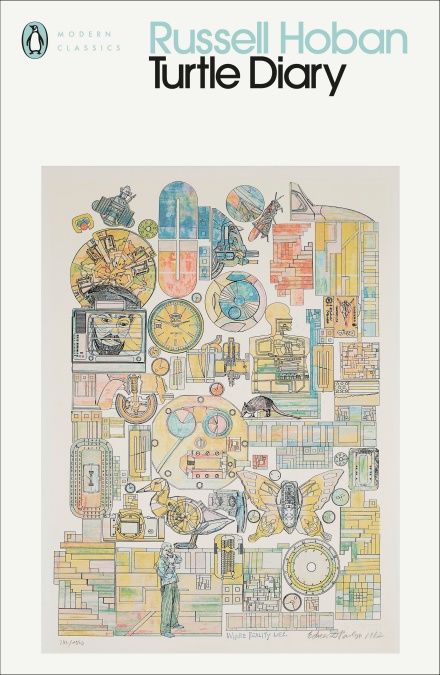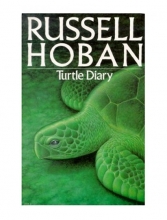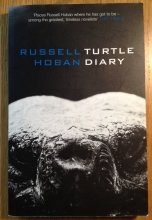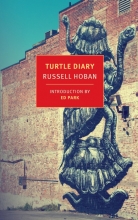Turtle Diary (Novel, 1975)

Summary:
In the aquarium at the London Zoo, three sea turtles swim endlessly in 'their little bedsitter of ocean'. Two lonely people, William G and Neaera H, become obsessed with the turtles' captivity, and resolve to rescue them and release them in to the sea. William's and Neaera's diaries tell the story of how they achieve the turtles' freedom, and in the process re-define their own lives.
Detailed description:
William G. works in a bookstore; Neaera H. is an author of children's books. Two lonely, embittered people who don't know each other, but whose thoughts are gradually verging toward similar territory. William G. is forty-five, lives alone in an apartment, haunted by thoughts of the family he's been separated from by divorce, especially the daughters he no longer sees. In a particularly poignant moment early on he observes, "There must be a lot of people in the world being wondered about by people who don't see them anymore."
Neaera is forty-three, and unmarried; thinks of herself as the sort of spinster woman who has "resisted vegetarianism" and doesn't keep cats. She's tired of writing books about cuddly animals, and guardedly contemplates her married friends who "wear Laura Ashley dresses, and in their houses are grainy photographs of them barefoot on continental beaches with their naked children." She's resigned to her aloneness, and at one point observes, "My despair has long since been ground up fine and is no more than the daily salt and pepper of my life."
There's no particular reason why their lives should intersect, except that they share a fascination: turtles, particularly three green sea turtles in the Aquarium of the London Zoo. Each begins making repeated visits to the zoo to gaze at the turtles swimming gracefully in their tank, and ponder the irony of creatures capable of making a migratory journey of thousands of miles--who "have it in them to find something"--being prevented from doing so. And separately, they make the same inquiries to the Head Keeper, who "seems a right sort of man": suppose someone wanted to kidnap the turtles and set them free, how might they go about it?
Soon, William and Neaera's lives begin to intersect in earnest, as the keeper proves surprisingly receptive to their inquiries. Though he's been rebuffed by the higher-ups at the zoo, he feels that after twenty or thirty years in captivity, the turtles deserve their freedom. With his cooperation, soon William and Neaera are bundling the turtles in a van and setting off for the coast.
At this point, the predictable thing would be for the story to veer into romantic territory as the two find the solution to their mutual loneliness in each other; the reader is all but expecting it. But Mr. Hoban doesn't do the predictable thing; he's more honest and less sentimental than that. Exactly how things do unfold must be left to the reader to discover, but it's not destroying any significant suspense to say that ultimately, William and Neaera are indeed altered by the mission they embark on, and the synchronicitous intersection of their lives.
Review quotes:
"A story about the recovery of life...Like other cult writers--Salinger for instance, or Vonnegut--Hoban writes about ordinary people making life-affirming gestures in a world that threatens to dissolve in madness."--Newsweek
"Crackles with witty detail, mordant intelligence and self-deprecating irony."--Time
"This wonderful, life-saving fantasy will place Russell Hoban where he has got to be--among the greatest, timeless novelists."--The (London) Times
"Russell Hoban is our ur-novelist, a maverick voice that is like no other. He can take themes that seem too devastating for contemplation and turn them into allegories in which wry, sad humour is married to quite extraordinary powers of imagery and linguistic fertility that makes each book a linguistic departure." --Sunday Telegraph
"The marvellous energy of Mr. Hoban's writing, simultaneously dry and passionate, justifies everything he does."--Times Educational Supplement
"Russell Hoban is an original, imaginative and inventive. Though some of his work has been compared with that of Tolkien and C.S. Lewis, he is his own man, working his own vein of magical fantasy."--The (London) Times
"Turtle Diary is a disquisition on loneliness as perfect and inexhaustible as the Beatles' 'Eleanor Rigby' or Chekhov's 'Lady with the Little Dog,' a work of art that vibrates on a new frequency each time you read it, depending on the weather in your life." - Ed Park, from his introduction to the new 2013 edition
"[The] dissonance between the simple turtle story and the irresolvable adult story ... makes Turtle Diary a quiet masterpiece" - Brian Gittis, Bookforum
"Links to buy online" do not imply endorsement of the sellers. Users of this site are advised to compare prices before buying.



